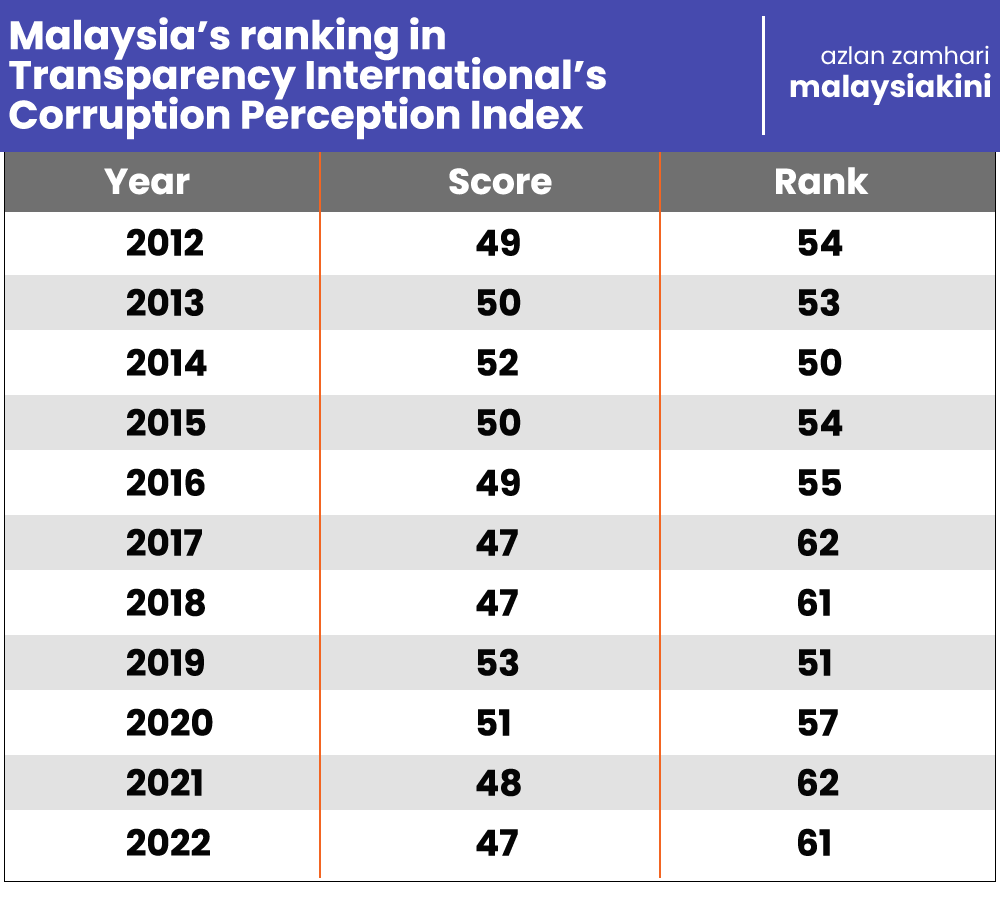Prime Minister Anwar Ibrahim must “put action” into his words against anti-corruption by carrying out long overdue reforms, said the Center to Combat Corruption and Cronyism (C4).
Among these include reforming the MACC and revising the Whistleblower Protection Act 2010.
C4's comments come after Malaysia's score in the Transparency International (TI) CPI 2022 had dropped for the third year in a row, scoring 47 of 100 points in the index.
In a statement, C4 said that the MACC must be granted full independence and autonomy in its investigative capacity as the central corruption-fighting body.
It said that the MACC must be freed from any undue influence or intervention from external parties such as the executive.
C4 added that an oversight entity must be formed to oversee MACC’s appointments for the post of chief commissioner, its budget, and manpower-related areas.
Currently, the MACC falls under the purview of the prime minister.
Meanwhile, C4 said that the Whistleblower Protection Act 2010 needed to be amended to allow disclosure to external parties, such as the media, members of Parliament, civil society organisations, and other bodies not listed by the act.
“In the same vein, accord public interest defence to whistleblowers that disclose information despite being prohibited by written laws such as Official Secrets Act 1972, Section 133 of Financial Services Act 2013 as well as Section 203A of the Penal Code,” said C4.
Earlier this week, TI announced that Malaysia ranked 61 in the CPI index in 2022. In 2021, it was 62.

For the record, the CPI uses a scale of zero to 100, where zero is perceived to be highly corrupted and 100 is perceived to be very clean.
In response to the latest CPI score, Anwar pledged to fight against misappropriation, stating that the government would be consistent in offering its continuous support to the MACC to combat corruption.
However, the MACC has not come without its own set of controversies in recent years.
In January 2022, MACC chief commissioner Azam Baki came under the spotlight over his shares ownership in two publicly-listed companies between 2015 and 2016, raising questions about conflict of interest.
Lalitha Kunaratnam, the whistleblower who exposed Azam’s history of shares, was served with a defamation suit by the latter, demanding an apology and RM10 million in damages.
The MACC was also criticised for its investigation into judge Mohd Nazlan Mohd Ghazali for acting against another independent institution.
Mohd Nazlan was the trial judge in the RM42 million SRC International corruption case against former prime minister Najib Abdul Razak. He has since been elevated to the Court of Appeal.
Lack of political will
C4 opined that Malaysia’s “deplorable” score in the index was due to an evident lack of political will among lawmakers to strategically and effectively address corruption.
It said that in line with his anti-corrupt pledges, Anwar must carry out several reforms, particularly those aligned with the National Anti-Corruption Plan (NACP) 2019-2023.
It also reiterated calls to legislate a Public Procurement Act and the Political Financing Act.
It also called on the prime minister to mandate the practice of asset declaration.
“The battle against corruption can no longer be taken for granted. To that end, the government is advised to approach reforms with greater conviction and, at the same time, engage more closely with civil society members, so as to strengthen public confidence in the government’s commitment to this matter.
“When the rule of law takes a back seat in the face of unabated corruption, civil rights, democracy, and the lives of Malaysians will ultimately pay the price.” - Mkini




No comments:
Post a Comment
Note: Only a member of this blog may post a comment.